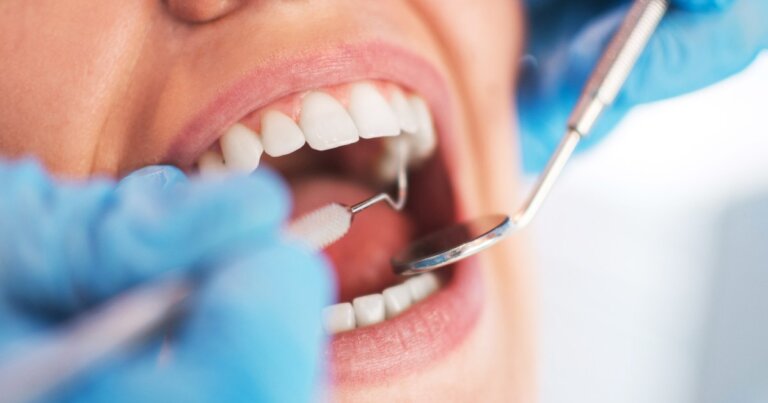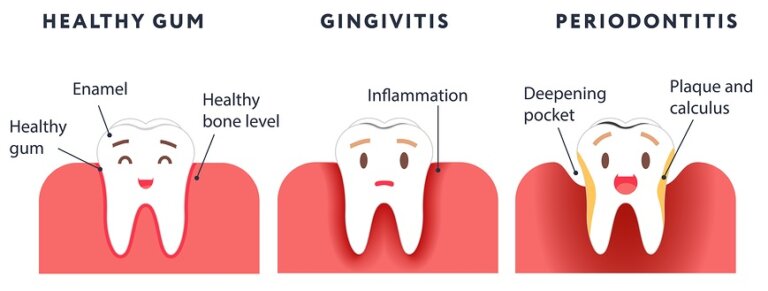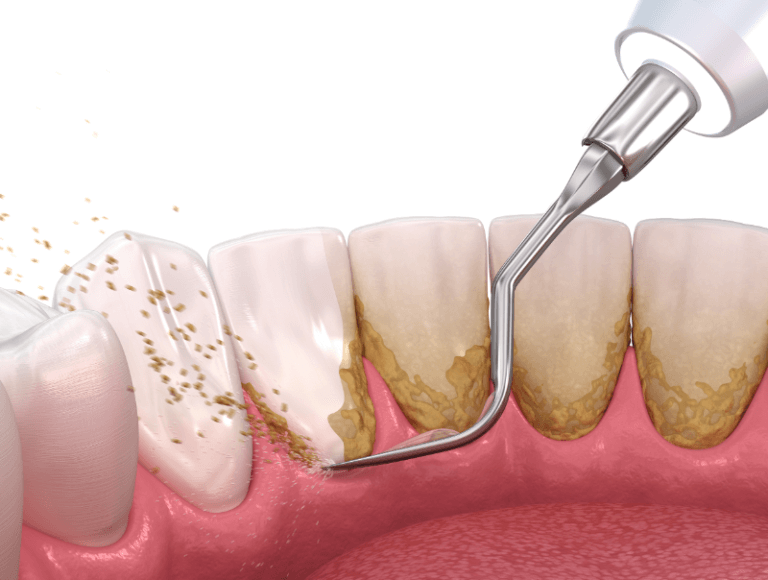Scaling and Root Planing

What Is Scaling and Root Planing?
Scaling and root planing is a non-surgical deep cleaning procedure performed by dentists or dental hygienists to treat gum disease. It involves two main steps:
- Scaling: The removal of plaque and tartar (hardened plaque) from both above and below the gum line. These deposits harbor harmful bacteria that cause gum inflammation and infection, leading to gingivitis or periodontitis.
- Root Planing: Smoothing the tooth root surfaces to remove bacteria and promote the reattachment of gums to teeth. Smooth roots make it harder for plaque to accumulate, helping prevent further gum disease.
By thoroughly cleaning the teeth and roots, this procedure helps restore gum health, prevent tooth loss, and improve overall oral hygiene. Before deciding on whether Scaling and Root Planing are right for you, there are some things you should know:
- Who Needs Scaling and Root Planing?
- Benefits Of Scaling and Root Planing
- Alternative Treatments To Scaling and Root Planing
- How Much Does Scaling and Root Planing Cost?
- Steps In The Scaling and Root Planing Procedure
- Frequently Asked Questions About Scaling and Root Planing
If you have any further questions about Scaling and Root Planing or other dental services offered at Atlas Dental, please contact us.

Free phone consultation
Have questions about scaling and root planing? Schedule a free phone consultation with our cosmetic dentist.

5 star google reviews
Our patients love us! See for yourself why more and more people are choosing Atlas Dental for scaling and root planing.

BOOK scaling and root planing ONLINE
Scheduling scaling and root planing in downtown Toronto has never been easier with our online booking system!
Who Needs Scaling and Root Planing?
Scaling and root planing is particularly beneficial for individuals with:
- Gum Disease Symptoms: Red, swollen, or bleeding gums, receding gums, or persistent bad breath.
- High Risk of Gum Disease: Smokers, diabetics, or those with a family history of periodontal issues.
- Poor Oral Hygiene: Inconsistent brushing or flossing habits that lead to excessive plaque buildup.
Early intervention through scaling and root planing can help reverse gum disease and maintain oral health. If you have further questions about Scaling and Root Planing, please contact us.

Benefits Of Scaling and Root Planing
Scaling and root planing offers numerous advantages:
- Prevents Gum Disease Progression: Stops gingivitis from advancing to severe periodontitis.
- Reduces Inflammation and Bleeding: Promotes healthier gums and minimizes infection risks.
- Improves Breath and Oral Hygiene: Removes bacteria responsible for bad breath and plaque buildup.
- Encourages Gum Reattachment: Smooth root surfaces help gums heal and reattach to teeth.
- Lowers Risk of Tooth Loss: Strengthens the support structures around teeth.
- Boosts Overall Health: Reduces the risk of systemic health issues like heart disease and diabetes linked to gum disease.
By preventing the progression of gum disease and promoting overall oral hygiene, it helps ensure a healthier mouth and a better quality of life. If you have further questions about Scaling and Root Planing, please contact us.

Alternative Treatments To Scaling and Root Planing
If scaling and root planing isn’t the right option, consider these alternatives:
- Regular Professional Cleanings: Suitable for mild gum disease (gingivitis).
- Enhanced Oral Hygiene: Brushing twice daily, flossing, and using antibacterial mouthwash.
- Antibiotic Therapy: Topical or oral antibiotics to manage bacterial infections.
- Laser Therapy or Periodontal Surgery: Advanced treatments for severe gum disease.
It’s important to discuss these alternatives with your dentist to determine the best course of action for your specific situation. Each treatment has its advantages and limitations, and your dentist can help you choose the most appropriate method based on the severity of your gum disease and your overall health needs. If you have further questions about Scaling and Root Planing, please contact us.

Cost of Dental Cleaning
A typical dental cleaning is around 1 hour long, and will therefore cost $261. The codes relevant to teeth cleaning in the Ontario Dental Association’s Suggested Fee Guide appear as follows:
Scaling
- 11111 – One unit of time (15 minutes): $74
- 11112 – Two unit of time (30 minutes): $142
- 11113 – Three unit of time (45 minutes): $200
- 11114 – Four of time (60 minutes): $261
- 11115 – Five unit of time (75 minutes): $325
- 11116 – Six unit of time (90 minutes) $391
You may be offered additional services such as Polishing to remove extrinsic stains and Fluoride treatment to protect your teeth against future cavities:
Polishing
- 11101 – One unit of time (15 minutes): $36
- 11107 – Half unit of time (7.5 minutes): $29
Fluoride
- 12111 – Rinse: $9
- 12112 – Gel or Foam: $37
- 12113 – Varnish: $38
Dental cleanings are considered a basic service under all dental insurance plans and should be covered to your maximum insurable limit, but be sure to find out from your dental insurance plan provider how much you are eligible for before going ahead with dental treatment. Our fees are consistent with the ODA Fee Guide.
For patients without dental insurance, Atlas Dental is pleased to offer dental financing through iFinance Dentalcard. Affordable payment plans start at 7.95% for terms of 6 months to 6 years. To learn more about Dentalcard dental treatment financing, follow this link.
Steps In The Scaling and Root Planing Procedure
Here’s what to expect during the procedure:
- Examination: Assessment of gum health and dental x-rays to determine the extent of gum disease.
- Anesthesia: Local anesthesia ensures comfort throughout the procedure.
- Scaling: Removal of plaque and tartar using manual and ultrasonic tools.
- Root Planing: Smoothing of root surfaces to eliminate bacteria and encourage gum healing.
- Aftercare Guidance: Instructions on oral hygiene and follow-up visits.
By following these steps, your dental professional can help restore your gum health, prevent tooth loss, and improve your overall oral hygiene. If you have further questions about Scaling and Root Planing, please contact us.
Frequently Asked Questions About Scaling and Root Planing
- Is scaling and root planing painful?
Local anesthesia is used during the procedure to minimize discomfort. Some sensitivity may occur afterward, but it is manageable with over-the-counter pain relievers.
- How long does it take to recover from scaling and root planing?
Most patients recover within a few days. Your gums may feel tender or swollen, but this typically subsides quickly. Following your dentist’s aftercare instructions ensures a smooth recovery.
- Can scaling and root planing cure gum disease?
While scaling and root planing can halt gum disease progression and restore gum health, ongoing maintenance and good oral hygiene are essential for preventing recurrence.
- How often should I get scaling and root planing?
This depends on the severity of your gum disease. Patients with advanced periodontal issues may need periodontal maintenance every 3-4 months.
Early intervention through scaling and root planing can help reverse gum disease and maintain oral health. Atlas Dental makes it easy to schedule your deep cleaning procedure with our convenient online booking system. Contact us for healthier gums and a brighter smile!

